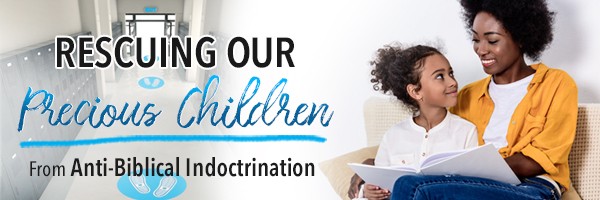
Imagine a two-lane road. On one end is a large government monopoly that seeks to control every facet of education and eliminate all competition. People who have their children in this system, and many who work for it, are usually oblivious to the perils of such a monstrosity. Or they see the dangers but don’t know how to get out.
On the other end of this highway is complete educational freedom. This is what I like to refer to as, “parent-directed, privately funded, family-centric, home-based education.” In this model, parents, not the government, decide what approach is best for their family. One lane leads to control and limited options, the other to unfettered choice.
Along this road are various rest areas. For families who are leaving the brick-and-mortar government school, the first stop may be virtual public (or charter) schools.
Public School at Home
Shonda is a single-parent mother, living in the Chicago Public School system. She has two sons, ages 14 and 11. They are constantly being offered drugs, enticed by gangs, and exposed to a terrible social atmosphere; not to mention deplorable school facilities and failing academics.
Shonda decides the best path for her boys is to get them out of the harmful social environment of the brick and mortar school, and enroll them in a public school at home. While she must work to provide for the family, her mother, who lives in an apartment near their house, is available to be home with the boys during the day. Shonda decides that with the accountability from the school system, and physical oversight from her mother, this step would enable her boys to at least be home, away from much of the peer pressure, in an environment where she is more aware of what they are being taught during the day. This is a better choice for her than she previously had.
This model is not considered, by law, to be official homeschooling, even though the academics are being learned in the home. This is still public (or better said “government”) schooling. However, it is a better form of government schooling. You still can’t use a religious curriculum, you are still under the state’s requirements and regulations, you still have revisionist history, socialism and what used to be called, “Common Core,” but at least your children be home in a physical sense.
Public School / Private School Partnerships
Another stop along the road may be a government-funded (voucher) private school. Some voucher-funded private schools offer online options for students to use a Christian curriculum at home (a home-based private school student who is “homeschooling”), under the covering of the private school. This option is still government-funded, but for the present may provide Christian content, rather than anti-Christian textbooks.
Some states offer free non-core, elective classes directly to homeschoolers or private school students through the government school system. To utilize these programs, some states require a student take at least two online classes and two seated classes through the local public school district. In exchange, the partnership student can receive elective classes like swimming lessons, band practice, physics, computer programming, basket weaving or horse-back riding.
When a family signs up with a partnership in Michigan (for example), there is little additional regulation to them (at this time), other than reporting to the local school district (which is not a legal requirement for non-partnership homeschooling families in the state). The local school district in exchange for giving out a few small benefits, may get as much as 85% of the total annual funding from the state for that school year. So even in areas where student funding is a low as $10,000 per year, per student, the local school district receives at least $8,500 in additional tax funding (above their current budget) for each homeschooling student who enrolls.
If I were a school administrator looking to increase my revenues, I’d trade occasional basket-weaving classes for $8,500 all day long! That’s pretty good money for a non-core class or two!
Many families cannot see any reason to abstain from participating in these programs, and granted, there do seem to be some benefits. Parents get a few activities or classes for which they personally do not have to pay out of pocket.
Considerations
The problems that I see with partnership programs are as follows:
Funding Government Schooling / Increased Government Spending
Personally, I want to support education that is completely free from government control. When I (currently a private homeschooler) participate in a government partnership, I am supplying my local school district with extra funds, that they do not currently have. I make government bigger, not smaller. When I help local school districts qualify for more tax revenue, I put an increased tax burden on my neighbors (as they must pay for the bulk of my child’s “free” activities).
The argument goes, “I pay taxes, shouldn’t I get a benefit from it?”
Unless I am paying more than $8,500 a year in school taxes, I am not fully paying for even one my children to participate in these programs. That means someone else, perhaps an eighty-year-old grandmother living alone in a house she owns in my neighborhood, is required to pick up the tab. If I have five children in a partnership program, the tax burden my family generates is $42,500 per year. Over ten years, this is $425,000 in additional taxes incurred on taxpayers for my children to learn basket-weaving. If ten of my friends (with the same number of children – some will have more, some less) also do this, that means our little homeschool group of ten families is costing taxpayers at least $4.25 million dollars over ten years. That’s a lot of money to give some music or swimming lessons.
The thing is, nearly all of these classes can, and should, be taught privately, through local privately funded homeschooling support groups or co-ops. Many parents have expressed that they don’t like having to pay a small fee for these services or having to volunteer a few hours of their own involvement in exchange for free classes. I guess what comes to my mind is that if it isn’t *that* important to you to invest a little of yourself in this process, why is it so important? Our culture has embraced an entitlement mentality, where we believe that we are owed “free” things, simply because we want them. The problem is nothing is ultimately free. Someone is paying for these services. If we are not fully funding them ourselves, then the money is coming from people who are being forced to pay for our child’s activities against their will.
Funding Non-Religious Education
While the classes / activities in which my child is enrolled may not be deemed “religious,” the extra tax revenue I generate for the local school district, by having my child participate in a partnership, goes to fund many beliefs that, as a Christian, I do not want to fund. I do not like funding the narrative that we are all cosmic accidents who evolved from primordial slime to primates to eventually become meaningless humans. I do not want to fund the promotion of revisionist history in the textbooks where the Christian influence in our country is dismissed and/or ridiculed. I do not want to fund the promotion of situational ethics, and moral relativism. I do not want to fund transgender / LGBTQ propaganda, where young children are taught that gender is a fluid concept, and any sexual activity between consenting adults is a moral good. I prefer to defund these efforts, not contribute an extra $8,500 per year, per student, to these causes.
The Hook
While it often takes a long time to see it play out, the government always eventually controls what it pays for. Once the money leaves your wallet through taxation, it ceases to be “your money.” In Alberta, Canada (for example), private schools (and many homeschoolers who schooled through them) received government money annually through a voucher program. This went on for twenty years with seemingly no strings attached, until the government finally dictated a requirement that all schools that received government money must teach an LGBTQ-affirming curriculum.
Which Way Are You Headed?
I would encourage you to consider which direction you are headed on this educational road. Are you moving towards, or away from, parent-led, parent-controlled education of your children? Are you helping the government to grow larger, or are you supporting local, privatized groups that share your faith and values? How important are these extra “freebies,” for your child’s future? Can your goals and objectives be met without resorting to a government-controlled system of forced redistribution of wealth? Are the religious values you to claim to hold being clearly taught in your child’s curriculum?
We know this is an issue on which many conservatives strongly disagree. It is my hope that charity will prevail and we can extend kindness to people who may not be at the same “Rest area,” on this journey that we are. I hope that you will choose maximum liberty and freedom for your family, which I believe history has proven comes ultimately only through private funding. In the end, we know that parents who love their children make different choices, and we won’t all agree. I truly hope you are moving in the correct direction on the highway. I am grateful for you giving me a hearing on this matter.






















